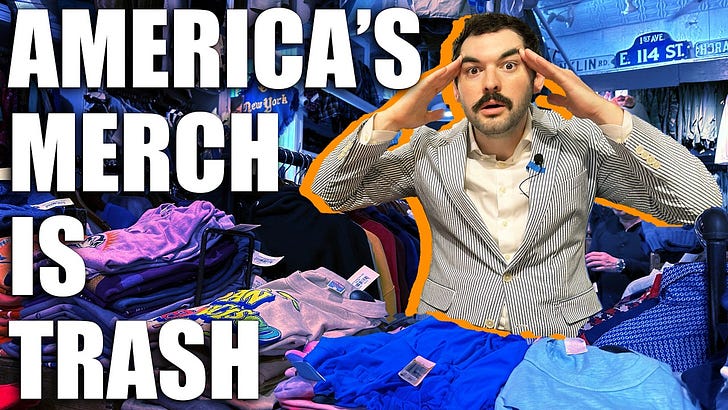Cotton of the Carolinas
Our T-shirts are grown by American farmers and made in American textile factories
Our goal with the Rural Revival Project is to uplift small towns across America in every way we can. When it came time for us to choose t-shirts to sell, we prioritized buying clothes manufactured in North Carolina, with cotton grown by American farmers. A couple generations ago that was normal. Today it is not.
As the above video shows, 97% of the clothes we wear in America are made in other countries and imported. Globalization has decimated our domestic capability to grow and mill cotton and ultimately our ability to clothe ourselves. With an increasingly unstable global marketplace, this information should be unnerving to everyone except nudists living in the Sun Belt.
We could have made a lot more money by simply getting cheap t-shirts for a couple bucks a pop made in Indonesia or India, and then sold them for a huge markup. Instead, we invested in t-shirts at fifteen to twenty bucks each that actually support North Carolina factories and farmers. For our shirts, we found a remarkable company- TS Designs - headquartered in Burlington, NC.
For our third ‘Truth Talk’ in Spruce Pine we were lucky enough to be joined by the CEO of TS Designs, Eric Henry.
Eric’s the kind of guy who you know is working hard. His emails arrive in your inbox at 6am, and he runs a tight ship. He’s been CEO at TS Designs for decades and been through the rollercoaster ride of trying to make clothing in America with American cotton. It’s not easy.
One of the worst moments in Eric’s career came in the mid-nineties when President Clinton and politicians from both parties led the charge to pass the North American Free Trade Agreement (NAFTA). Basically, NAFTA incentivized companies to move textile factories from the US to Mexico for cheaper labor. Almost overnight, Eric was forced to layoff most of his workforce when he could no longer compete with foreign-made shirts on price. At that point, he could have sold the company and retired early, or even moved the factory to Mexico/elsewhere and made millions. Instead he listened to the voice in his heart. There were still lots of people who worked at his company in Burlington and he was not going to put them out of a job.
As Eric shared his story, the people in attendance were inspired. We got question after question about ways we could fix this clearly broken textile system. One cool idea someone in the audience came up with was to figure out a way that Future Farmers of America (officially FFA) could link up with TS Designs to get their t-shirts made here. People wanted young farmers and aspiring millers and manufacturers to re-learn the art of milling cotton, and to continue the strong textile tradition of the region.
Eric mentioned that only a few decades back, it was relatively common for some counties in North Carolina to have their own cotton farms, mills and textile factories. So you could actually get a t-shirt grown by a local farmer and processed in a local mill, and made by people in your home county. Today, not only can you not get a t-shirt made in your county, you can rarely even get one made in your own country. TS Designs is one of the only places that actually has an idea of its supply chain.
Unfortunately, what we were sold as progress in the 1990s did not actually lead to real economic or environmental health. The truth is we sold out the American farmer and the American worker and prioritized Wall Street over Main Street.
What happens when you prioritize profits over healthy local economies is waste.
Eric shared that today, 25% of all clothes never even make it out of the package. Because of fickle fashion trends, companies make way more t-shirts than they think will sell, just in case pink becomes the hot new color this Fall. Because the plastic shirts are so financially cheap to make, they take big gambles on quantity. The result is that billions and billions of clothes are thrown away after never having been worn once. A lot of this wasted clothing is shipped to a massive desert in South America where it is burned.
The whole conversation was pretty eye-opening, and alarming. Noticed a lot of people checking the labels on their clothes as we wrapped things up. We took a fifteen minute break.
As we began our next talk- An Unconventional Response- some people had gone out and bought our Rural Revival Project t-shirts and put them on.
Sometime talking leads to action.
Let’s pray for a future in rural America where US cotton mills and US t-shirt manufacturing returns. Let’s start buying clothes grown by US farmers and made here.




🙌🏻✝️🙏🏼❤️
Wonderful.